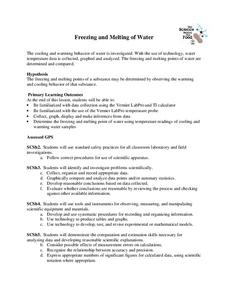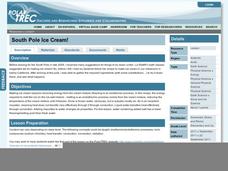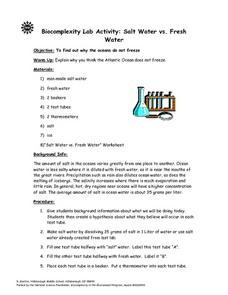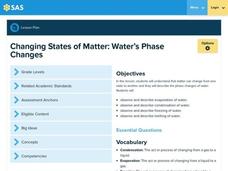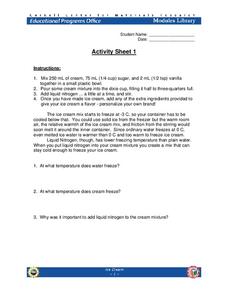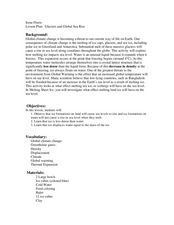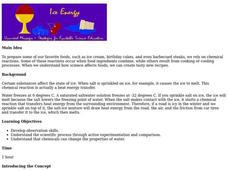University of Georgia
Freezing and Melting of Water
Examine the behavior of energy as water freezes and melts. An engaging activity provides a hands-on experience to learners. Collaborative groups collect data and analyze the graphs of the temperature of water as it freezes and then...
Curated OER
Melting and Freezing Behavior
High schoolers investigate melting and freezing behavior in substances. For this melting and freezing points lesson plan, students perform experiments to test the impact of various salts on the freezing point of water, they test the...
Santa Monica College
Introducing Measurements in the Laboratory
We use basic units of measurement to break down things and communicate clearly. The first lesson in an 11-part series teaches the proper way to measure various items. It starts simply with measuring the dimensions and areas of geometric...
Curated OER
Freezing Point Depression
Students create ice cream in a zipped bag and measure the temperature of a salt/ice mixture. They discover how salt lowers the temperature necessary to freeze ice to a solid (below 0'C).
Nevada Outdoor School
Let It Snow! Let It Melt!
Winter weather offers a great opportunity to teach young scientists about the states of matter. This activity-based lesson includes a range of learning experiences, from experimenting with the rate at which ice melts to singing a song...
Curated OER
The Frigid Gourmet
Students make a " science surprise" or ice cream in the lab. In this melting point depression lesson plan, students use various substances with ice to determine the effects on the melting point of ice and the ability to make ice cream....
Curated OER
Phase Changes of Water
A micro-unit on the phase changes of water includes three laboratory activities. Junior scientists compare the densities of ice and water, and then they do the same for cold and warm water. They examine freezing and boiling temperatures....
Hazardous Waste Management Program
Molar Mass Determination from Freezing Point Depression
Let the data tell the story. A lab activity has pupils collect temperature data on solutes as they melt and freeze. They use their data to create a cooling curve and then calculate the molar mass using the freezing point depression.
Curated OER
Ice Cream: a Taste of Science!!
Learners define the term solution. They explain conservation of energy and energy transfer as it relate to how the milk solution became ice cream. Students are able to explain freezing point depression.
Curated OER
Temperature Change and the States of Matter
Tenth graders observe the processes of evaporation, condensation, melting, freezing, boiling, and sublimation. They do a quantitative investigation of the freezing of water, to explore explanations that involve particles.
American Chemical Society
Changes Caused by Heating and Cooling
It's heating up—and cooling down—in here! A hands-on lesson allows learners to experiment with melting and freezing butter to observe changes as a substance transitions between liquid and solid form. They also view an animation that...
Curated OER
Heating and Cooling Curves
High schoolers experiment with a pure substance and a phase change. In this heating and cooling curves lesson plan, students study the effects of heating and cooling a pure substance to observe a phase change. They determine both the...
Curated OER
Ice
Students examine the different propereties of ice, such as freezing temperature. In this scientific lesson students complete several activities using ice, like making ice cream.
Center for Learning in Action
Water—Changing States (Part 1)
Here is part one of a two-part lesson in which scholars investigate the changing states of water—liquid, solid, and gas. With grand conversation and up to three demonstrations, learners make predictions about what they think will happen...
Polar Trec
South Pole Ice Cream!
How can you turn an ice cream activity into a scientific investigation? It's easy if you know ionic compounds, heat transfer, and the exothermic and endothermic process. Learners will explore the science behind freezing, insulation, and...
Center for Learning in Action
Water – Changing States (Part 2)
Here is part two of a two-part lesson in which scholars investigate the changing states of water—liquid, solid, and gas—and how energy from heat changes its molecules. With grand conversation, two demonstrations, and one hands-on...
Curated OER
Salt Water vs. Fresh Water
Students explore why the oceans do not freeze. They explain why they think the Atlantic Ocean does not freeze. Students are given background information about what they are doing. They create a hypothesis about what they believe...
Pennsylvania Department of Education
Changing States of Matter: Water’s Phase Changes
Third graders observe the properties of water and in its different states. In this states of matter lesson, 3rd graders view a video, read The Magic School Bus at the Waterworks and experiment with freezing, melting and boiling water to...
Virginia Department of Education
Molar Heat of Fusion for Water
How can you describe heat of fusion in a way the class understands and relates the importance of this concept to present day issues? In this third lesson of the series, learners conduct an experiment, demonstrating the flow of heat...
Cornell University
Isotopes
What better way is there to learn about isotopes than to play with them? Chemistry young scholars manipulate the number of protons and neutrons in a hands-on activity. Individuals try to score the largest number of points by collecting...
Virginia Department of Education
Heat and Thermal Energy Transfer
How does radiation affect our daily lives? Answer that question and others with a lesson that discusses radiation and its use in thermal energy transfer through electromagnetic waves. Pupils investigate vaporization and evaporation while...
Curated OER
Glaciers and Global Sea Rise
Students explain how melting glaciers affect global warming. In this earth science lesson plan, students investigate the change in ice density as it melts. They discuss the human and environmental impact of rising sea levels.
Curated OER
Ice Energy
Students investigate how salt affects the state of ice. In this ice cream making lesson plan, students change the freezing temperature by adding salt and observing the results. Students use experimentation and comparison to see how...
Curated OER
State Change
Eighth graders explore the physical change of matter. As a class, they discuss their favorite super hero and determine if the hero undergoes a physical or chemical change. Students examine the change of state and phase change. In groups,...


